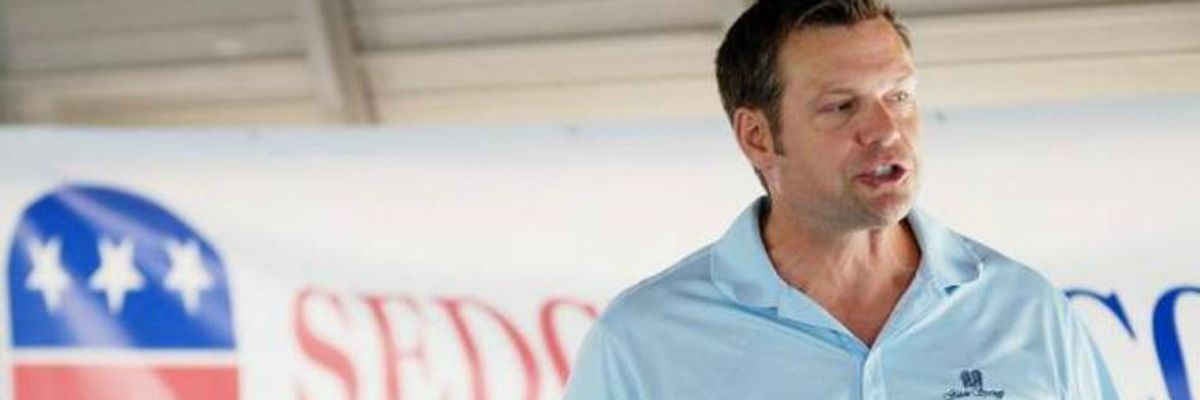As long as I count the votes, what are you
going to do about it? --Attributed to William Marcy Tweed
Kansas is back in the news, and the purpose of this column is to reassure Kansans that although he played a vital role as a member of the Republican Party Platform Committee, their Secretary of State Kris Kobach, has not let the affairs of Kansas languish.
Mr. Kobach's role on the Republican Platform Committee has been significant. One of his accomplishments was getting language inserted into the platform that addresses the border wall Donald Trump has proposed. The language that he caused to be inserted states that: "The border wall must cover the entirety of the southern border and must be sufficient to stop both vehicular and pedestrian traffic." The Platform Committee also responded favorably to Mr. Kobach's suggestion that the platform condemn the 2015 U.S. Supreme Court opinion legalizing gay marriage, a decision he called "obviously incorrect." Mr. Kobach is a lawyer so he is in a good position to evaluate the correctness of decisions rendered by the country's highest court.
Notwithstanding his involvement in convention activities, Mr. Kobach still had time to address critical issues in Kansas. The most critical issue confronting Kansans during the upcoming election season, as Kansans who follow such things know, is non-citizen-voter fraud and here, under Mr. Kobach's guidance, is how it has been addressed.
On July 11, 2016, the Kansas Rules and Regulations Board approved a temporary regulation that pertains to Kansas citizens who register to vote at motor vehicle offices but do not bring with them proof of citizenship. The new rule is expected to impact roughly 17,000 voters who registered to vote at motor vehicle offices without providing proof of citizenship. Here is how that the new rule will work in practice.
When voters who registered to vote at motor vehicle offices without presenting proof of citizenship show up to vote, they will get the same ballot as everyone else, but it will be treated as "provisional" and, after the election, only votes on that ballot for federal races will be counted and votes for local races will not.
Mr. Kobach was not acting mindlessly in asking for this new regulation. The Kansas legislature had already enacted the Secure and Fair Elections law that imposes proof of citizenship requirements on Kansas voters who want to register to vote, but the law had already been successfully challenged in 2016 in both state and federal courts. In January, a District Court Judge in Shawnee County Kansas ruled that: "a person is either registered to vote or he or she is not. . . . [T]he right to vote, is not tied to the method of registration."
In May, U.S District Judge, Julie Robinson, said that the Kansas Statute ran afoul of the National Voter Registration Act (NVRA) the aim of which is to make voter registration simple rather than difficult. She said that Kansas cannot require proof of citizenship in order for citizens to register to vote in federal elections. In her ruling, Judge Robinson observed that by having one kind of registration for federal elections and another for state elections, Kansas will have a two tiered election regime "that would create separate requirements for registering to vote for federal and state elections." She observed that that" "is a problem of the State's own making. If the State wishes to change its voter registration laws that directly contradict the provisions of the NVRA, it does so at its own risk. To the extent such laws are preempted by the NVRA, they may not apply to registration for federal elections."
Although Mr. Kobach appealed both those rulings, he knew he had to do something before the 2016 elections took place since no appeal would be finally decided until after the elections. And that is why he found it necessary to persuade the Kansas Rules and Regulations Board to enact the regulations described above. The new regulations may not, however, be the panacea Mr. Kobach hoped. On July 19, 2016, the ACLU filed suit attacking the newly issued regulations claiming that they violate both state law and the state constitution. Its hope is to have the constitutionality of that regulation addressed by the court in advance of the upcoming elections.
It is easy to be critical of Mr. Kobach and attribute his persistence to a wish to suppress voter turnout. That would not be fair since his concern about non-citizens voting is not without justification. As Judge Robinson observed in her opinion, "There is evidence of only three instances where noncitizens actually voted in a federal election between 1995 and 2013" and, she further observed that during that same period about 14 non-citizens attempted to register. Only a partisan would deny that those examples justify Mr. Kobach's attempts to protect the sanctity of the Kansas voting process by disenfranchising 17,000 Kansas citizens.
